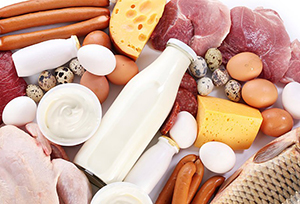There is little doubt Russia’s decision to ban food imports from EU countries, in retaliation for economic sanctions placed on it by Western governments, will cause considerable damage to the economies of both sides.
 The EU ships around 10% of its agricultural exports to Russia annually, making it a key market in one of the central pillars of the bloc’s economy, and the list of banned products will hit many member states hard.
The EU ships around 10% of its agricultural exports to Russia annually, making it a key market in one of the central pillars of the bloc’s economy, and the list of banned products will hit many member states hard.
Around €5 billion will be wiped off the EU’s agricultural export income in the coming year, affecting everyone in the sector, across all 28 states, from smallholders up to large food producers.
Further inflation inevitable
In Russia, it will be the people that pick up the bill with the supply shortages inevitably pushing up grocery costs for staple items – meat, fruit, vegetables, milk, cheese and fish- and further driving inflation.
Tellingly, perhaps, Putin’s government has not restricted alcohol imports, meaning fine European wines, whisky and liqueurs can still grease the wheels of business in the upper echelons of Moscow society.
Russian Prime Minister Dmitry Medvedev’s assertion that Russian agriculture can step up to fill the supply gap is a stretch to put it mildly – the sector is heavily in debt (by the government’s own admission) and the economic sanctions, which include a ban on Western funds going to the country’s agricultural bank, will further restrict the capitalisation of the industry.
Fresh trade deals with Latin American partners such as Brazil, Argentina and Ecuador (perhaps the only ‘winners’ here) will plug some of the gaps, in particular meat, but they are on the other side of the world to Russia and will not be able to provide the ‘quality’ products (specialist, region-specific cheeses and meats, for example) that consumers there have become accustomed to and the EU provides.
EU must act fast
The EU could also be left with a large tab to pick up from its own producers.
There is no doubt that the bloc’s actions in pushing for a trade deal with Ukraine and the subsequent backing of sanctions has set Russia on the road to banning EU agri-food imports, so it is now surely the responsibility of legislators to help those affected.
Brussels looks likely to fight the bans at the World Trade Organisation, but as has been displayed by the response to Russia’s ban on EU pigmeat, this is not a quick process for resolution.
If every country now seeks out compensation, as Poland did earlier in the week after Russia banned fruit and vegetable imports on health grounds, then the Commission is facing a hefty bill. Job losses, reduced plantings and lower farmgate prices look inevitable.
Solutions such as a Private Storage Aid scheme to gather up the products that would have been destined for Russia have also been mooted but can such a scheme be implanted in time to assist those in need?
In particular, as Alan Bullion said earlier this week in his analysis article (written prior to the bans being announced), those states that were once part of, or satellites of, the former Soviet Union but now more aligned with Europe deserve special attention, more so in light of the percentage of their products that go to Russia.
Among other changes, the coming year will see a significant redrawing of the EU agricultural trade map as a result of Russia’s decision. Brussels must come up with solutions quickly to ensure that the latest blow in this contest between political heavyweights does not end up being a knockout punch for many in Europe’s farming sector.
Source: agra-net.net



